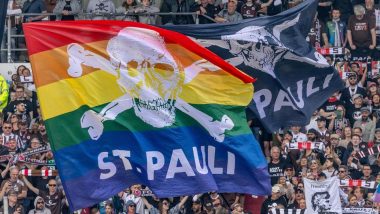Newly promoted to Germany's premier football league, Hamburg's St. Pauli club is set to light up the game with a passionate mix of music, creativity and social justice.When US musician Dave Doughman was touring Germany with his band in the early 2000s, the show in Hamburg was empty until local football club St. Pauli finished its game.
Also Read | Sports News | Mumbai Half Marathon to Have 20,000 Participants, Tendulkar to Flag off Race.
Suddenly, the venue was "full of people wearing Jolly Roger t-shirts" — the skull and crossbones symbol of the St. Pauli team — recalled Doughman.
"What is this, a pirate convention?" he wondered.
Coming from Dayton, Ohio, Doughman had "zero interest in football." But the singer and guitarist soon realized that these "buccaneers" were both soccer and alternative music fans who were avowedly anti-homophobic, anti-sexist and anti-racist — values the indie musician shared.
The football club had also adopted the song "Hells Bells" by rockers AC/DC as the walk-on anthem at games, and it blasts "Song 2" by Britpop band Blur every time the team scores.
"Wow, this is cool," Doughman decided.
Soon he was seeing St. Pauli t-shirts at gigs across Germany. He developed an affiliation with a football culture scene that has its roots in the bohemian bars, clubs and squats of inner-city Hamburg. He even got into the sport.
By 2010, Doughman was living in the St. Pauli neighborhood, which adjoins Hamburg's Reeperbahn entertainment and red light district. He and his band, Screaming at Motorists, released the song "St Pauli 'til I die" the next year. By 2016, he had started up a music school at the club's legendary Millerntor stadium.
From pop superstar Ed Sheeran to US punk band Blink 182 and Irish upstarts Fontaines D.C., a growing number of international musicians have been spotted wearing the iconic Jolly Roger t-shirt and jacket.
Many other global music acts, from Green Day to Bad Religion and the Kaiser Chiefs, have stopped by the Millerntor to pay their respects.
All will be celebrating St. Pauli's promotion to the Bundesliga this season for the first time in 13 years. The team plays its debut game on Sunday, and the Millerntor will literally be rocking.
Fans united by football and fighting fascism
St. Pauli has been promoting the rights of refugees, people of color and the homeless since squatters and anti-fascist activists rallied behind the football club in the 1980s.
At the time, a growing far-right fan base at crosstown rivals Hamburger SV motivated left-wing students and artistic residents to support St. Pauli, which also opposed the increased evictions in the district.
As violent, hard-core Hamburg SV fans began to attack squats on Hafenstrasse, the road leading to Millerntor stadium, new fans flocked to a struggling St. Pauli team that was playing in the lower leagues. It's said that average home crowds grew tenfold by the end of the decade. The team has rarely been successful on the pitch, but the stadium is always full and drowned in song.
Supporters adopted the skull and crossbones as their own unofficial emblem sometime in the 1980s after Doc Mabuse, a singer in a Hamburg punk ban who also lived in a squat, nailed a Jolly Roger flag to a broomstick and brought it to Millerntor.
Punk music soon became integral to the club and its anti-establishment football ethos, which is also reflected in St. Pauli's democratic management structure that allows club members to vote and make decisions as a collective.
"So many creative types and musicians who gravitate to the club are not necessarily sports fans," said Doughman of the sense of diversity and acceptance among St. Pauli fans. "They come because they know that the stadium is a safe space for everyone."
Captain of fashion, music — and St. Pauli
St. Pauli's Australian current captain, Jackson Irvine, is himself a musician who has played guitar in bands from a young age. With his mustache, long hair and tattoos, he is also a fashion icon who sometimes models clothes for local and international labels. Last season, in true St. Pauli style, he died his hair pink and wore pink-painted fingernails.
Irvine, who previously played in England and Scotland before transferring to Hamburg in 2021, has become a symbol of the club's authenticity and strong community roots.
"To be able to live in the shadow of the stadium among the fans," he said on St. Pauli TV in 2022, "even if I wasn't a footballer ... I feel like this would be my kind of neighborhood because of the culture and the feel."
He and his partner are often out at Hamburg venues supporting local bands, Doughman notes. These include the iconic Jolly Roger, a raucous local pub that features DJs and live music and is packed with fans on match day.
Irvine himself has been known to drop in for a drink when walking home from a home game at the Millerntor — as opposed to driving in a luxury sports car.
"It's nice to come in a have a quick one with the fans after a good result," he said of the bar bearing the team's unofficial badge.
The captain typically wears a rainbow flag armband in recognition of LGBTQ+ rights and in 2023, he spoke from outside the Jolly Roger about the importance of rejecting "toxic masculinity" and homophobia in football.
Living the football community dream
Today Doughman runs a music school that is sponsored by fashion brand Levi's and offers free lessons and recording sessions at Studio 501, which is located at the Millerntor. The program is aimed at community youth, including the children of refugees, young people in state care, and people with down syndrome.
"What other Bundesliga club has a music studio at its stadium," the musician told DW.
Doughman recently collaborated on the song "Ein Traum" (A Dream), which celebrates the team's promotion to the top tier of Germany's football league system and features a cast of musician fans. The single also made the charts on Spotify.
With a return to the Bundesliga, Doughman says the club can better promote anti-racism and refugee rights messages like "no one is illegal" to the wider world.
And even if the team is again relegated to the second division, St. Pauli home games will likely still be sold out, and the fans will keep building a unique fan culture.
"For me, it has always been about the community and the people," said Doughman of the football club where winning isn't everything.
Edited by: Cristina Burack
(The above story first appeared on LatestLY on Aug 23, 2024 02:40 PM IST. For more news and updates on politics, world, sports, entertainment and lifestyle, log on to our website latestly.com).













 Quickly
Quickly




















